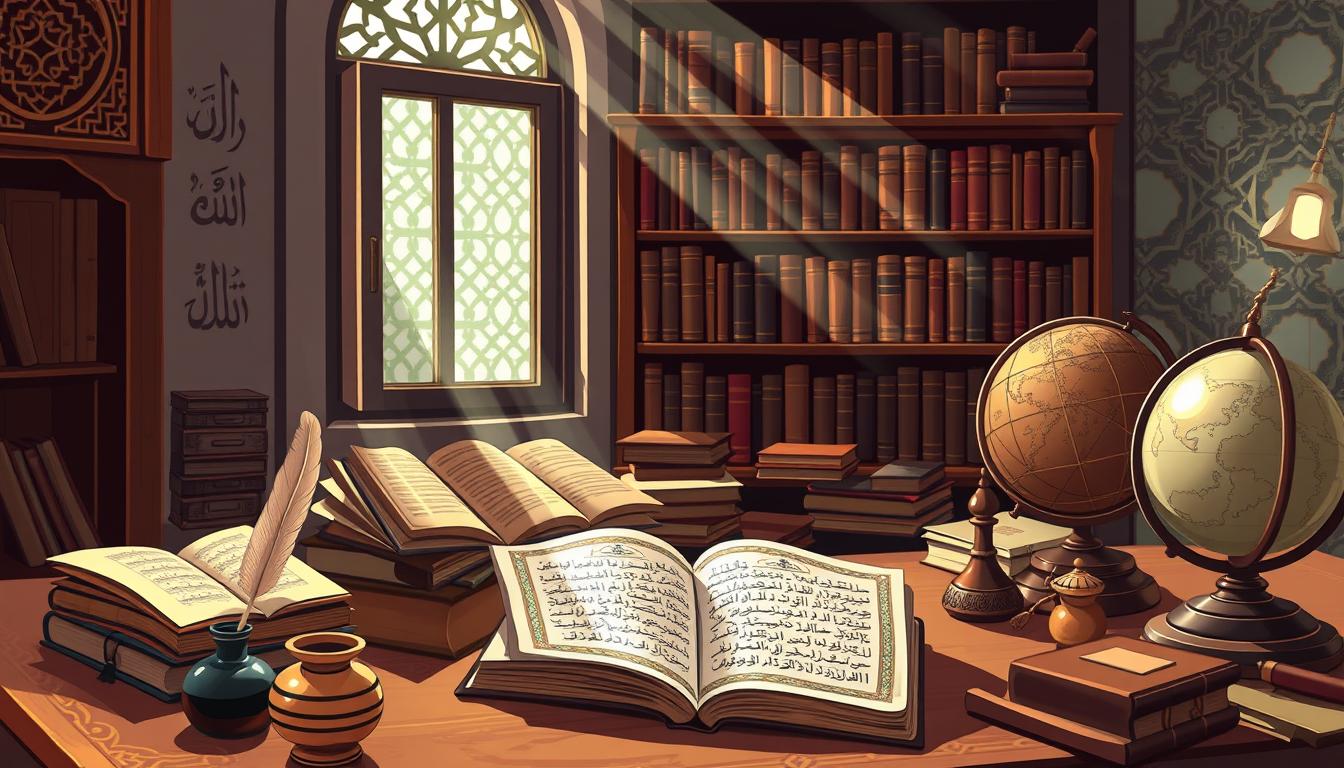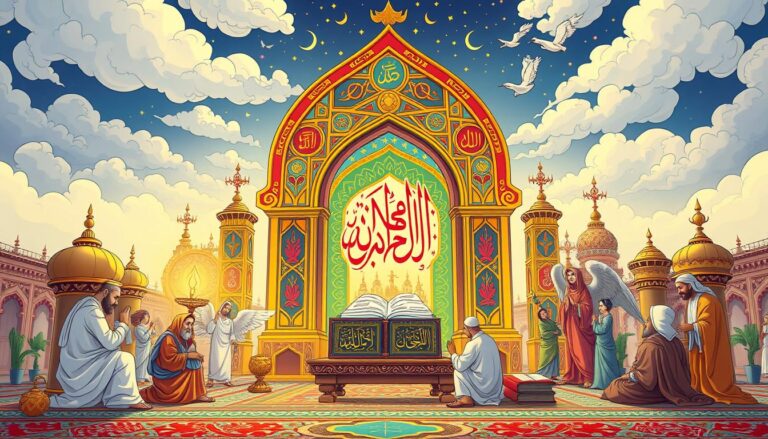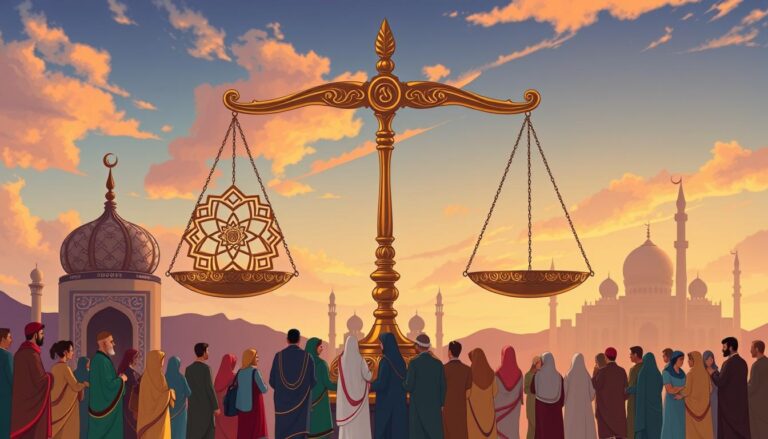Understanding the Quran: 10 Surprising Insights from Tafsir
Have you ever wondered why the Quran, a book over 1400 years old, still fascinates millions? Its deep wisdom and the tradition of tafsir, or Quranic exegesis, are the keys. This article uncovers 10 surprising insights from tafsir, revealing the Quran’s profound teachings.
The Quran was given to Prophet Muhammad over 23 years. It’s a vital part of Islamic faith. With 114 chapters, or surahs, it guides us. From the revered Surah Al-Fatiha to recognizing old scriptures, its influence on Islamic theology is vast.
Tafsir, the study of the Quran, opens a window into Islamic thought. It shows how Prophet Muhammad explained verses and lived the Quran. Scholars like Sayyid Abul A’la Mawdudi have also enriched our understanding through the ages.
As we delve into these insights, we’ll see the Quran’s linguistic wonders, scientific insights, and prophetic messages. Join us on this exploration, where ancient wisdom meets modern understanding in the study of the Quran.
Key Takeaways
- The Quran was revealed over 23 years, addressing evolving needs of the early Muslim community
- Tafsir provides essential context for understanding Quranic verses
- Prophet Muhammad directly explained and exemplified Quranic teachings
- The Quran contains references to scientific phenomena and fulfilled predictions
- Modern technology has increased global access to Quranic study
The Gradual Revelation of the Quran
The Quran, a sacred text, was revealed over 23 years. This slow process was key for early Muslims’ spiritual growth. It started with Surah Al-Alaq (96:1-5) in the Cave of Hira, beginning a journey of change.
The Meccan and Medinan Phases
The Quran’s revelation happened in two phases: Meccan and Medinan. Each phase met different needs of the Muslim community. The Meccan phase covered basic beliefs, and the Medinan phase focused on laws and governance.
Addressing Evolving Needs
This gradual method helped the early Muslim community understand and apply teachings step by step. It took into account the social, cultural, and geographic backgrounds of the people. This made the teachings more relevant and effective.
Significance of the 23-Year Period
The long period of revelation was key for Islamic preaching’s success. It allowed for a deep grasp of the Quran’s teachings. This led to spiritual growth and societal change. This approach still shapes Islamic scholarship and religious studies today.
“The gradual decline of the Qur’an is crucial for the effectiveness of Islamic preaching” – Mushaf: Jurnal Tafsir Berwawasan Keindonesiaan
Understanding this gradual revelation sheds light on the Quran’s role as a guide for Muslim life. It offers wisdom for both worldly and spiritual matters.
The Linguistic Marvel of Quranic Arabic
The Quran’s language is a true marvel. It uses Classical Arabic to share its message with grace and clarity. This has amazed scholars and believers for centuries.
Looking closely at the Quran shows its unique style. It uses repetition and parallelism to make its message stronger. The way it’s structured, with ellipsis and subtle meanings, adds to its depth.
The Quran’s use of similar words shows its wisdom. Words like خَشْيَة (khashyah), وَجل (wajal), and خَوف (khawf) all mean fear. But each has its own shade of meaning. This makes the Quran easier to understand and interpret.
“The importance of understanding the relationship between Arabic linguistic and theological concepts in the Quran is crucial to enhance comprehension of Islamic principles.” – Solehah Yaacob
The Quran’s language shapes Islamic thought and is vital for over 1.6 billion Muslims. Its unmatched beauty inspires endless study and reflection. It stands as a linguistic wonder in religious texts.
Unique Structure and Organization of the Quran
The Quran’s structure offers deep guidance in Islamic theology. It stands out from other religious texts. The holy book has 114 chapters and over 6,000 verses, each with deep spiritual meaning.
Surahs and Verses
The Quran has 114 chapters, or surahs, of different lengths. The longest, Al-Baqarah, has 286 verses. The shortest, Al-Kawthar, has just 3. This variety shows the depth and range of Islamic teachings.
Non-Chronological Arrangement
The Quran’s chapters aren’t in historical order. Instead, they’re arranged by length. Longer chapters come first, followed by shorter ones. This order helps with spiritual growth and memorization.
Significance of Surah Lengths
The length of each surah has its own meaning in Islamic theology. Longer chapters cover complex topics with detailed guidance. Shorter chapters, revealed in Mecca, focus on basic beliefs and morals. This structure helps understand Islamic principles fully.
“The Quran’s structure is a miracle in itself, offering revelatory guidance through its unique organization,” notes Shaykh Hamīduddīn Farāhī in his book, Dalāil an-Niẓām.
The Quran’s unique structure inspires and guides millions of Muslims. Its organization makes it easy to study and recite. It’s accessible to all who seek knowledge in Islamic theology.
Divine Preservation of the Quranic Text
The Quran is a unique sacred text in religious studies. Its preservation over centuries is thanks to a divine promise and careful transmission. The process began with Abu Bakr and was finalized by Uthman, ensuring its authenticity.
Memorization was key in keeping the Quran safe. Both men and women helped in this effort, building on the Prophet’s memorization. Zaid ibn Thabit’s role in recording revelations was crucial for keeping the text accurate.
The Quran’s compilation wasn’t without its challenges. Different manuscripts showed variations, known as the seven aḥruf. Companions like Ibn Masʿūd had different recitations. Uthmān ibn Affan’s work was vital in making the Quran consistent for us today.
“The Holy Quran contains knowledge of the past, present, and future, providing timeless guidance from Allah.”
The Quran is unique because it has not changed since it was revealed. This sets it apart from other sacred texts. It acknowledges other revelations like the Gospel and Torah but highlights its own divine protection.
Studying the Quran brings spiritual enlightenment, wisdom, and blessings. It guides us in our daily lives and promises rewards in the Hereafter. The Ijazah certificate allows holders to share this sacred knowledge, keeping it alive for future generations.
Scientific Insights in the Quran
The Quran offers amazing scientific insights that match modern discoveries. This shows a deep connection between Quranic exegesis and science. It has brought spiritual enlightenment to many.
Embryonic Development References
The Quran talks about human embryonic development with amazing accuracy. Modern scientists have confirmed this. It describes the growth stages of a fetus, showing knowledge beyond its time.
Cosmological Descriptions
Quranic verses hint at cosmic phenomena that science has only recently confirmed. For example, it talks about the universe expanding, a concept that matches modern cosmology. The Big Bang theory is reflected in the Quran’s words about the heavens and earth separating.
Natural Phenomena Explanations
The Quran gives insights into natural processes. It accurately describes the water cycle, confirmed by meteorology. Marine studies have also backed up the Quran’s mention of barriers between water bodies. These connections inspire spiritual enlightenment.
“There are around 750 verses in the Noble Quran dealing with natural phenomena.” – Mr. Shamsher Ali
These scientific insights in the Quran prove its divine origin. They continue to amaze both believers and researchers.
Prophetic Elements and Fulfilled Predictions
The Quran is a treasure of prophetic wisdom, offering insights that last forever. It shows many predictions that have come true, proving its divine origin. A notable example is the prediction of Roman victory over the Persians, which happened years later.
Quranic verses like 46:2-3 talk about its divine source and purpose. They mention the creation of heavens and earth and a set time for everything. This view matches modern science, showing the Quran’s timeless wisdom.
The spread of Islam worldwide is another prediction that came true. Starting in Arabia, Islam has grown to touch billions of lives, as the Quran said it would.
“Verily, We have sent down the Book to you in truth.” – Quran 39:2
The Quran stresses the importance of monotheism, challenging old beliefs. Verses like 46:4-5 question the idea of worshipping other gods. They say these gods won’t answer until the Day of Resurrection.
These fulfilled prophecies boost the faith of believers and encourage critical thinking. The Quran’s prophetic nature continues to inspire and guide, connecting ancient wisdom with today’s world.
Understanding the Quran: 10 Surprising Insights from Tafsir
Tafsir is key in Islamic theology. It helps Muslims understand the Quran’s deeper meanings, even if they don’t speak Arabic. It prevents misunderstandings and connects believers with Allah’s guidance.
The Role of Tafsir in Quranic Understanding
Tafsir gives a deep look into the Quran’s messages. It helps Muslims apply Quranic teachings in their daily lives. Now, online platforms offer Tafsir lessons worldwide, reaching more people than ever before.
Historical Context in Tafsir
Tafsir scholars study the historical background of Quranic verses. This helps readers understand the context of each verse. It shows how the Quran’s wisdom is relevant today for Muslims.
Linguistic Analysis in Tafsir
Tafsir involves studying the Quran’s Arabic text deeply. Scholars look at word choices, grammar, and literary devices. This reveals meanings that simple translations might miss.
“Only those who approach it sincerely for faith and guidance will be healed and elevated by its teachings.”
Engaging with Tafsir requires an open heart and mind. It’s not just about reading; it’s about reflecting deeply on each verse. This process, known as tadabbur, helps Muslims grow and strengthen their faith.
The Quran’s Impact on Arabic Language and Culture
The Quran has deeply influenced Arabic language and culture. It has added to Arabic vocabulary and inspired many writers. Its impact is seen in all parts of Arabic-speaking societies.
The Quran’s recitation is key in Islamic education and culture. It has helped keep Classical Arabic alive for centuries. The Quran’s beautiful recitation has also shaped Arabic music and poetry.
The Quran’s eloquence has raised the bar for Arabic writing. Many writers use its phrases and themes in their work. This keeps the language fresh and meaningful for all ages.
“The Quran was revealed to Muhammad by the angel Jabreel over a period of 23 years in the seventh century CE.”
The Quran also shapes education. Studies like tafsir and ta’wil have grown into big subjects. These areas keep evolving, staying true to tradition while meeting today’s needs.
In short, the Quran’s effect on Arabic language and culture is huge and lasting. It acts as a linguistic and spiritual guide for Arabic speakers everywhere.
Digital Age and Quranic Accessibility
The digital revolution has changed how we interact with religious texts. This is especially true for the Quran, Islam’s holy book. Now, technology makes it easier for Muslims to study and seek spiritual growth.
Mobile Apps and Online Platforms
Smartphones and tablets have become like portable Qurans. Apps offer audio recitations, translations, and tafsir (interpretations). These digital tools meet the needs of everyone, from beginners to scholars.
Technology’s Role in Quranic Study
Digital platforms improve Quranic learning. They provide:
- 151 resources on the Prophet’s life (seerah)
- 208 items on Islamic sermons (khutbahs)
- 30 guides on understanding God
- 41 resources on repentance and spiritual growth
These tools make studying the Quran more accessible and engaging for Muslims everywhere.
Global Reach through Digital Mediums
The internet has made the Quran more accessible. Online platforms offer:
- Translations in many languages
- Discussion forums for spiritual growth
- Live-streamed lectures and classes
- Virtual communities for shared learning
This global access helps deepen understanding of Islam in different cultures and communities.
The Quran’s Central Role in Sunni Islam
In Sunni Islam, the Quran is the heart of Islamic beliefs. It guides on spiritual, social, and moral issues. Sunni Muslims see it as the highest authority, treating it with deep respect.
The Quran’s impact goes beyond religious acts. It teaches values like kindness, fairness, and honesty, for all people. These lessons help believers connect with others and find peace within. Understanding the Quran is key for Sunni Muslims to live by these teachings every day.
The Quran talks about ‘inner meaning’ in the Moses and Khidr story (Q18:65-82). This idea shows that there are deeper meanings to its words. It also says only the pure can truly grasp its essence (Q56:79). This shows how complex and rich Quranic interpretation is in Sunni Islam.
Source Links
- Mawdudi, Vol 10, S. 38-46
- 4 Ways the Prophet Explained the Quran, With Examples (English translation) – Understand Al-Qur’an Academy
- 10. Surah Yunus (Jonah) – Sayyid Abul Ala Maududi – Tafhim al-Qur’an
- Al-Qur’an is a linguistic miracle, a compilation
- The Literary Beauty of the Qur’an
- Structural Cohesion In The Quran: Heavenly Order
- The Origins of the Variant Readings of the Qur’an | Yaqeen Institute for Islamic Research
- Tafsir Surah Yunus – 99 – Quran.com
- 15 Mind-Blowing Facts About The Quran (With Infographic) | The Quran Classes
- The ʿUthmānic Codex: Understanding how the Qur’an was Preserved | Yaqeen Institute for Islamic Research
- 13 Scientific Facts in the Holy Quran
- 10 Astonishing Scientific Miracles of the Quran – Idara Alfurqan
- Surah Al-Ahqaf 46:1-10 – Towards Understanding the Quran – Quran Translation Commentary
- Prophecies Fulfilled: The Qur’anic Arabs in the Early 600s
- Educational Platform to Learn Islam, Read Quran Translation, Allah, Prophet Muhammad. ONE God. ONE Message. PROPHETS OF GOD including Adam, Noah, Abraham, Moses, Jesus and Muhammad
- Why is It Important To Learn Quran Tafsir?
- Keys to Tadabbur: How to Reflect Deeply on the Qur’an | Yaqeen Institute for Islamic Research
- Criticism of the Quran
- The Quran in Its Historical Context | Department of Theology | University of Notre Dame
- 9 Scientific Miracles of the Quran (No. 4 Will Surprise You!)
- Learning to Understand the Qur’an | Yaqeen Institute for Islamic Research
- Discover 10 Fascinating Facts About The Holy Quran | Awwal Quran
- Esoteric interpretation of the Quran







